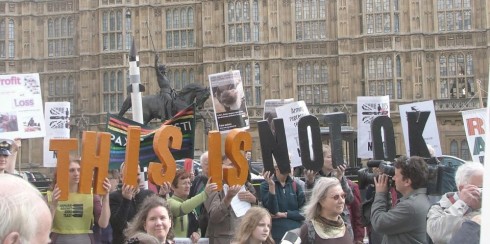UN Arms Trade Treaty – Campaign Against Arms Trade
http://www.caat.org.uk http://blog.caat.org.uk
http://www.un.org/disarmament/convarms/ArmsTradeTreaty
The Arms Trade Treaty is the name of a potential multilateral treaty that would regulate the international trade in conventional weapons. The treaty will be negotiated at a global conference under the auspices of the United Nations from 2 – 27 July 2012 in New York. MORE
Campaign Against the Arms Trade
Campaign Against Arms Trade (CAAT) is a UK non-governmental organisation that campaigns against the international arms trade. It was set up in 1974 by a number of peace and other organisations who were concerned about the growth in the arms trade following the Middle East war of 1973. It is a broad coalition of groups and individuals in the UK working to end the international arms trade. CAAT claims that this trade has a negative effect on humans rights and security as well as on global, regional and local economic development. In seeking to end it CAAT’s priorities are to:
- end government subsidies and support for arms exports;
- end exports to oppressive regimes;
- end exports to countries involved in an armed conflict or region of tension;
- end exports to countries whose social welfare is threatened by military spending;
- support measures, both in the UK and internationally, which will regulate and reduce the arms trade and lead to its eventually end.
- http://www.sourcewatch.org/Campaign_Against_the_Arms_Trade
- http://en.wikipedia.org/wiki/Category:Weapons_trade
- „The work of Campaign Against Arms Trade is really great and uplifting. I wish we had something comparable in the U.S.“ – Noam Chomsky
Disarm The Gallery campaign launch action – Love art but not arms companies? Then join us at noon on Saturday 31st March for a mass art-action to launch our campaign to Disarm The Gallery and end the National Gallery’s links with the arms trade.
Whether you’re willing to don a costume and engage in street theatre, leaflet passers-by or engage children and tourists in some arty fun, your help will be welcome!
Background: The National Gallery regularly hosts evening events for arms dealers seeking to impress their clients with drinks and dinners in its lavish surroundings. Arms company Finmeccanica buys this privilege for only £30,000 a year.
In 2011 the world’s largest arms fair took place in London, bringing together authoritarian regimes and weapons manufacturers from around the world. The National Gallery hosted its evening reception. Unless we stop them, it looks like the gallery will again host arms dealers during this year’s Farnborough Airshow in July!
Please let us know you are coming so we can keep you up to date with the latest plans: outreach@caat.org.uk.
If you can’t make it, please support the campaign by writing to the director of the gallery: http://act.caat.org.uk/lobby/61
http://www.iisd.org/gsi/subsidy-watch-archive
The UN Special Rapporteur on food Olivier de Schutter in his report to the United Nations Human Rights Council warned that bad nutrition is creating more sick people. He called for more agricultural subsidies to increase production of healthy foods such as cereals. http://www.srfood.org
An agricultural subsidy is a governmental subsidy paid to farmers and agribusinesses to supplement their income, manage the supply of agricultural commodities, and influence the cost and supply of such commodities. Examples of such commodities include wheat, feed grains (grain used as fodder, such as maize or corn, sorghum, barley, and oats), cotton, milk, rice, peanuts, sugar, tobacco, and oilseeds such as soybeans. MORE
Global funding for agricultural research, public and private, is estimated to total around $40 billion. There is a stark contrast with the $1500 billion the world now spends on weapons.
Arms control
 |
This article is part of the Center for Media & Democracy’s focus on the fallout of nuclear „spin.“ |
During 2005, the United States „provided nearly half of the weapons sold to militaries in the developing world, as major arms sales to the most unstable regions—many already engaged in conflict—grew to the highest level in eight years,“ according to a Congressional Research Service (CRS) report. [1] The United States „supplied $8.1 billion worth of weapons to developing countries,“ which was „45.8 percent of the total and far more than second-ranked Russia with 15 percent and Britain with a little more than 13 percent.“
„Arms control specialists said the figures underscore how the largely unchecked arms trade to the developing world has become a major staple of the American weapons industry, even though introducing many of the weapons risks fueling conflicts rather than aiding long-term US interests.“ [2]
„The United States, for instance, also signed an estimated $6.2 billion worth of new deals last year to sell attack helicopters, missiles, and other armaments to developing nations such as the United Arab Emirates, Pakistan, India, Israel, Egypt, Kuwait, and Saudi Arabia. Developing nations are designated as all those except in North America, Western Europe, Russia, Australia, and New Zealand.
„In addition to weapons already delivered, new contracts for future weapons deliveries topped $44 billion last year—the highest overall since 1998, according to the report. Nearly 70 percent of them were designated for developing nations.“ [3]
http://twitter.com/ComingFamine
http://en.wikipedia.org/wiki/Fair_trade
http://www.sciencealert.com.au/features/Coming Famine
http://paper.li/ComingFamine/World Food Daily
http://en.wikipedia.org/wiki/Arms_trade
http://en.wikipedia.org/wiki/Arms_industry
http://en.wikipedia.org/wiki/Arms_trafficking
http://www.facebook.com/campaignagainstarmstrade
Kofi Annan argues that while regulation may prevent future financial crises, financial systems should be built to inherently promote fairness. He offers the example of how farm subsidies in rich nations hurt farmers in poor countries, concluding that we need to „level the playing field.“
#VIDEO engl. subtitles – Welthunger, subventionen, Freihandel http://www.righttofood.org
UN – Sonderberichterstatter für Menschenrecht und Nahrung plaudert aus dem nähkästchen, er definiert Begriffe wie Freihandel Subvention und Hunger…
Comments are closed.
